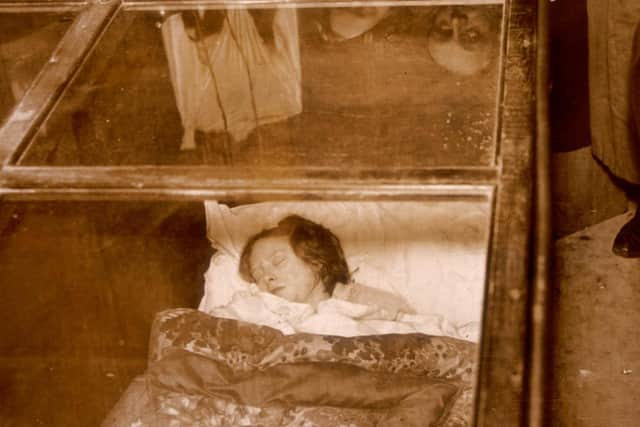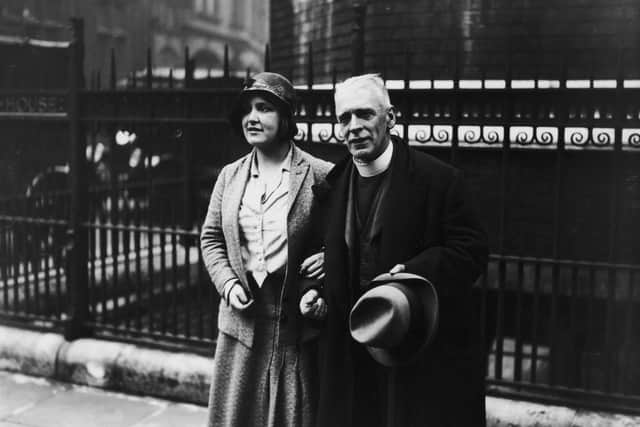Strange world of early 20th century sideshows in Blackpool
and live on Freeview channel 276
In the first half of the 1930s, the ‘starving brides’ of Blackpool were all people could talk about.
They also had them in Margate and Skegness, and even Torquay.
Advertisement
Hide AdAdvertisement
Hide AdAnd every seaside resort had twisted and broken people on show.


But it was the starving brides of Blackpool that impressed themselves upon the people of Britain.
The first of them was probably Joyce Heather.
In the summer of 1931, she could be seen on the Promenade, close to Central Pier, sitting in a barrel with a glass window in the top.
She had been promised £200 if she could go without food for 10 days.


Advertisement
Hide AdAdvertisement
Hide AdThis was two years after Ricardo Sacco, a professional ‘fasting man’, had come to a tragic end on Church Street.
The man who showed him was Luke Gannon, and he was the man who was now showing Joyce.
A former weaver and soldier, Mr Gannon lived on his wits. He had been a brawler, and possibly a blackmailer, and spent a lot of time behind bars. And as far as the authorities were concerned, he was a real fly-in-the-ointment.
Joyce, in contrast, was a mere amateur.
But when she gave up with only one more day to go and the £200 in sight, there was widespread public suspicion.
That suspicion quickly turned to anger.
Advertisement
Hide AdAdvertisement
Hide AdA kerfuffle took place in the middle of the Promenade. And Luke could only watch as an angry mob tipped the barrel over and rolled it into the sea.
But he wasn’t the sort of man to let that put him off.
The following year, he was back in Blackpool with a new woman, Nellie Heyes, and with the Reverend Harold Davidson as well.
He was the defrocked vicar of Stiffkey in Norfolk, who wished to protest about the Church of England, and to raise money to mount a legal challenge against it.
Nellie and the vicar were exhibited in barrels at Luke Gannon’s premises on Central Beach – at the corner of Brunswick Street, where the Funland arcade now stands.
And then, newly-weds were suddenly all the rage.
Advertisement
Hide AdAdvertisement
Hide Ad‘Brides and bridegrooms straight from the altar starve for 30 days,’ the posters on the Promenade said. ‘What courage! Will they do it?’
If they did it, they might win £250 – the equivalent of around £18,000 today.
They would invariably be placed in glass cases, often separated from one another, and the emphasis would always be on the bride.
She would wear a white dress, and her case would invariably be called a ‘coffin’.
Advertisement
Hide AdAdvertisement
Hide AdWhen Barbara MacDonald went on display, she had been a bride only a few hours. To emphasise that point, a three-tiered wedding cake was placed right outside her case.
‘It will be a constant reminder of what depends on my success,’ the new Mrs MacDonald told a reporter.
Mr Gannon’s was one of at least three such shows in 1934.
There was another one at an arcade called the White House, and a third at the Trocadero.
‘The lovely bride lies here starving,’ the bold, colourful signs said. ‘
Advertisement
Hide AdAdvertisement
Hide AdThe pluckiest girl in the world now lies here in a coffin.’
Blackboards had urgent bulletins chalked on them, such as, ‘Starving Brides! Sinking Fast!’
And waxwork figures pretended to show the bride ‘before’ and ‘after’ her ordeal – one radiant, the other emaciated and bedraggled.
That sense of urgency was taken up by the burly men who stood at the door.
Advertisement
Hide AdAdvertisement
Hide Ad‘Don’t waste your chance,’ they would shout. ‘She might be gone tomorrow!’
Patrons would pay twopence to be ushered behind a curtain into a darkened room.
The coffin they would find there would be barely 8 feet long, 3 feet wide or 4 feet high, with a glass top through which the bride could be viewed.
She would be lying down and barely moving, save for an occasional flicker of the eyelids behind her veil.
These shows were popular.
Advertisement
Hide AdAdvertisement
Hide Ad‘You would be flabbergasted if you came here at the weekend,’ one of the burly men told a reporter.
‘On Saturday and Sunday, we have queues of people waiting to come in.’
The reporter found a man in a well-cut suit inside the arcade, wearing a monocle and carrying a leather briefcase.
There were two laughing girls and an old woman. And a Lancashire lady nodded towards the bride and said,
‘I’d rather pay twopence to see her feed.’
Advertisement
Hide AdAdvertisement
Hide AdNot everyone was in favour. John Bull, the pugnacious weekly magazine, called them ‘blatant and idiotic vulgarity’.
A vicar who hadn’t been defrocked wrote to the Home Office, calling them a ‘nauseating spectacle.’
And a Blackpool councillors frequently deplored the effect they were having on the town.
It wasn’t just these shows that got people angry.
Non-stop piano-playing also had that effect.
In April 1934, in an arcade on Central Beach, Syncopating Sandy set a record of 122½ hours.
Advertisement
Hide AdAdvertisement
Hide AdHe was really Donald Strickland of Bolton, and he favoured Beethoven.
But he could slip easily into Play to Me, Gypsy, and he could carry on one-handed when it was time to get washed.
Maud Collins of Longsight then set a record for a woman of fifty hours.
And Charles Dawson attempted Sandy’s record, but fell fully forty hours short.
Advertisement
Hide AdAdvertisement
Hide AdThis was all too much for Mr Fryer, whose house on Bonny Street backed onto the arcades.
‘The piano-playing has been going on at night for about two weeks,’ he said, when the matter came up in court.
‘It has been impossible for me to get to sleep. I have been on the Promenade at four o’clock in the morning.’
It was, though, the starving brides that got most of the attention.
Advertisement
Hide AdAdvertisement
Hide AdIn October, at a conference in Blackpool, a certain Lord Mottistone described them as ‘perfectly horrid, un-Christian and beastly shows.’
He was a politician and, like Luke Gannon, a former-soldier.
He had once been forced to resign from the Cabinet. And he would go on supporting Adolf Hitler for much too long.
‘If there is any trouble about any of the women,’ he announced from the platform, ‘I here and now promise to put down my humble tenner to buy her out of her coffin.’
Advertisement
Hide AdAdvertisement
Hide AdThat did the trick. The following day, a meeting was held at the Town Hall and the Deputy Chief Constable made a tour of the arcades, telling them to close.
Two fell into line, but Luke Gannon – as ever – was made of stronger stuff.
The authorities had no power to shut him down, he said.
The bride and groom had been examined by a doctor, and given a drink of milk. ‘They’ll remain here for another nine days, completing the thirty days, and at the end of that time they’ll be given the £250.
I’ll give it them even if it skins me.’
Mr Gannon’s show went on, and another one, which had closed, re-opened.
Advertisement
Hide AdAdvertisement
Hide AdThe bride there was too ill to be taken out of her glass coffin, the showman said, and spectators could now pay to see her recuperating on brandy and eggs.
But everyone – and not just the brides – was on borrowed time.
The power the authorities lacked in 1934 was granted to them the following year, by a special Act of Parliament.
Now, the Corporation could insist that all Blackpool showmen got a licence, and it could ban any side-show it didn’t like.
Advertisement
Hide AdAdvertisement
Hide AdIt could also control ice-cream manufacturers and holiday camps.
And it could even buy up any property on Central Beach, all the way from Central Station to Chapel Street.
Starving brides and piano marathons would finally be a thing of the past.
But that didn’t stop Luke Gannon.
He soon announced that he had sent an urgent cable to the Empress of Abyssinia.
Advertisement
Hide AdAdvertisement
Hide AdShe had recently completed a long fast in protest at Italy’s invasion of her country. Mr Gannon now invited her to repeat the feat in Blackpool, to ‘avert the calamity of world war.’
And he said that if the Empress wished to use his arcade on Central Beach for that purpose, he would be more than happy to make it available to her.
Comment Guidelines
National World encourages reader discussion on our stories. User feedback, insights and back-and-forth exchanges add a rich layer of context to reporting. Please review our Community Guidelines before commenting.